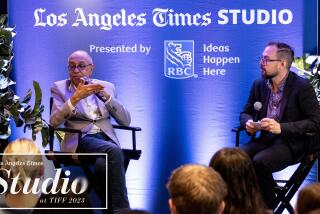Spartans Rule
- Share via
After seeing “300,” about the Spartans’ defiant stand against the Persian juggernaut at the Battle of Thermopylae, I had a few questions. For example, I rather doubted that the great Persian king Xerxes looked like Dennis Rodman, only taller and gayer. It also seemed implausible that the Persians had mutant rhinos. And while I knew the Thespians and Arcadians were allied with the Spartans, I wasn’t so sure about the Chippendales.
For these questions and more, I turned to my trusty, if not entirely trustworthy, Herodotus. I bought my copy of “The History” after seeing Anthony Minghella’s “The English Patient”--the main character, Almasy, carries the book around as a leather-bound portent of lives in war. Herodotus is history as it should be--breezy, hells-a-poppin’, bitchy, rocked with rumor and scandal. If Herodotus were alive today, he’d have a development deal with Paramount and be lunching at the Ivy.
It’s too much to say all the history I ever learned I learned from Hollywood, but Hollywood has sure made it easier to remember. If it weren’t for movies, I’d be hopeless on the line of succession to the British throne. But thanks to “The Lion in Winter,” “Elizabeth” (with Cate Blanchett), “Anne of the Thousand Days,” “Lady Jane,” “The Madness of King George” and a dozen or so more, I can rattle Tudors and Plantagenets off like an Exeter alum. Likewise, if it weren’t for last year’s HBO series “Elizabeth I,” starring Helen Mirren, I’d be damn hazy on Lord Burghley, Lord Walsingham and the Earl of Leicester. Future generations can look to Mirren’s “The Queen” when they wonder: Who was Dodi again?
Battle of the Bulge? “Patton.” The Samurai Rebellion? “The Last Samurai.” The conquests of Alexander the Great? Oliver Stone’s “Alexander,” which was so historically accurate that it made historians feel funny, you know, down there.
I’m not the least bit embarrassed by my enthusiasm for big-screen history. For one thing, postwar cinema generally fares no worse than other chroniclers of presumed authority and dispassion. In fact, cinema lately seems to feel a special obligation to accuracy and evenhandedness. Ridley Scott’s 2005 Crusader pic “Kingdom of Heaven” dared to portray Muslims as something other than glassy-eyed fanatics. By contrast, sitting on my desk right now is “A Patriot’s History of the United States” by alleged historians Larry Schweikart and Michael Allen, a book with the bizarre a priori that America--unlike Athens, unlike Rome and unlike the British Empire--is special, and that whatever mistakes were made (genocide of Native Americans) have been exceptions to the golden rule of national benevolence. Whatever.
Those who fret about cinema’s need to compress events and commingle characters, to emphasize certain events at the expense of others, don’t really want history anyway; they seek archeology. I grant that “Braveheart” made a haggis of the story of Robert the Bruce and William Wallace, but we get the essential idea, don’t we? The English king Edward I (Longshanks) was out-fought and out-maneuvered by the valiant Scotsman Wallace. Wallace was defeated at Falkirk and became a martyr for Scottish independence--though it’s highly doubtful his last words were “Freedom!” Probably something like, “Please put back my bowels!”
But returning to Herodotus: You might think “300,” having some fairly low-culture roots--it’s based on Frank Miller’s graphic novel, which itself was inspired by the middling 1962 film “The 300 Spartans”--might be indifferent to the particulars. Actually, the movie is rigorously faithful. We see the loss of 400 Persian ships to the great winds the locals call the Hellespontian. We see the slaughter of the hapless Medes, followed by the routing of Xerxes’ vaunted “Immortals.” There’s the betrayal of Ephialtes, even the quote of Dieneces, who jokes that if the enemy arrows blot out the sun then the Spartans will “fight them in the shade.” Great stuff.
Of course, this epic of Bronze Age beefcake takes liberties. I have two words for you: leather Speedo.
It’s certainly debatable whether this faithfulness is the product of reverence or simply a lack of imagination (I certainly wouldn’t want to try to outdo Herodotus). The important thing is that the story of Thermopylae, which would have been known only to a relative handful of saggy-pants fanboys before, had a $70-million opening weekend.
Likewise, I predict Herodotus is going to have a very good month on bestseller lists. Last year, when HBO’s wonderful, over-too-soon series “Rome” began, I went to the bookstore to buy an abridged copy of Edward Gibbon’s “The Decline and Fall of the Roman Empire.” Barnes & Noble had thoughtfully stocked up on the now-obscure volume, as well as Suetonius’ tremendously entertaining “Lives of the Twelve Caesars.”
I can’t help but smile when I think of all those teenagers poring over dear, dead Herodotus in search of a story that, when found, will be better than the movie. If this is America’s version of a classical education, it works for me.
More to Read
The complete guide to home viewing
Get Screen Gab for everything about the TV shows and streaming movies everyone’s talking about.
You may occasionally receive promotional content from the Los Angeles Times.






